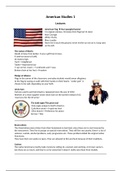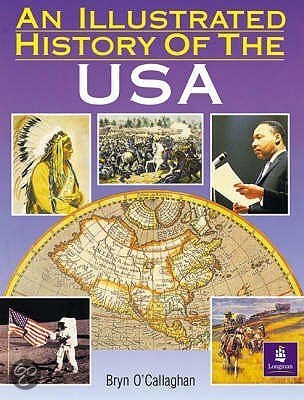American Studies 1
Lectures
American Flag Star spangled banner
13 original colonies, 50 states (First flag had 13 stars)
Red: Courage
White: Purity
Blue: Loyalty
Never let it touch the ground, never let the sun set on it, hang stars
on the left.
The statue of liberty
Stands in New York Harbor. It was a gift from France.
It took ten years to build.
46 meters high.
Torch = Enlightmet
Tablet = Represents law
7 rays on her crown = 7 continents and 7 seas
Broken chain at her feet = Freedom
Pledge of alliance
Flags in the corner of the classroom, everyday students would swear allegiance
to the flag by saying an oath with their hands on their hearts. ‘’under god’’ is
chosen to be said, depending on your faith.
Uncle Sam
Cartoon used to portrait America. Appeared since the war of 1812.
Workers of a meat supplier wrote Uncle Sam on the barrels instead of US.
I want you for the US army!
The bald eagle/The great seal
Only eagle unique to North America.
E pluribus unum = In god we trust
Olive branch = Preference for peace
Arrows = War
Reservations
The Amerindians were driven from their homelands to bad land, since those we’re not favoured by
the newcomers. They live in groups on special reservations. They still live very poorly, there’s a lot of
violence, suicide, alcohol problems, early pregnancies etc. These problems killed the original native
Americans.
They have their own police & taxes. They are allowed to fish and hunt because of their traditions.
Casinos
The native Americans mostly make money by selling oil, uranium and ranching. A lot own casino’s,
but there are so much, and they’re so far away that it doesn’t really save them from trouble.
,Utopia
America was considered new and perfect land. They wanted to shape America to a great society.
Manifest destiny
The frontier The idea was a meeting point between savages and civilization. It’s where the idea of
working hard and fighting through it, came from.
Free land
Equality for European man no matter how much money they had. It was for strong and brave people
who could make something out of a bare piece of land.
Virgin land
It was natural wilderness and needed to be tamed. creating a garden.
Puritans
People chosen by god who thought they had to create the perfect world. America was their new land
and George Washington their Joshua.
Farmers
Were admired because they established civilization. They were independent survivors and had a high
social status. They were a symbol of democracy.
Pioneers
They were explorers and pathfinders. They moved civilization forwards en their journey going west.
Frontiersmen
They tamed the wilderness and set an example for the society. They were free spirits and had
friendly relationships with the Amerindians. (Daniel Boone, Davy Crocket, Buffalo Bill)
Real Cowboys
They were Indian slaves from New Mexico. They wore classic clothes, rope, archery and knives. NO
guns. After the Mexican revolution they started collecting cattle, bringing them to Texas for grazing,
then on the train to the slaughter house. There was often one boss, nine cowboys, one cook and a
wagon. Their cattle consisted of around 3000 cows.
Fictional cowboy
Cowboys became popular through comics. They were claimed to be one with nature, heroes who
saw to seek justice, they were gallant to woman. They were typical good & bad stories, often
portraying the Indians as bad, involving a lot of gun fighting.
Immigrants and religion
It started in the colonial period by the Christian protestants. Dissenters were people who people who
were forced a religion by the king of England, they fled to Holland, later boarding the Mayflower to
America to create their own communities. The puritans felt that god wanted them to create a new
Eden (New world). They were not religiously tolerant. They believed that hard work meant pleasing
god and that they would find prosperity and heaven by doing that.
, Social action vs. Spiritual renewal
Social action meant helping people and to convince them of religion at the same time. Spiritual
renewal was more traditional, they tried to get to people through media and teach them to
understand god.
The Christian right / evangelical / fundementalist
They are very extreme and anti-modern. They have a lot of merchandise, reach to people through tv
and radio or travel shows.
Issues with the separation of church and state
Religious days were not legal as holiday days. Religious groups/school are independant of the
government and don’t get money from them. The national symbols however have Christian signs.
Creationism and evolution is both taught in school.
Faith hopping
There is faith hopping between different religions, not huge changes; for example, from protestant to
catholic.
Mormons Largest indigenous group in the US. In history they often had multiple wives.
Scientology They believe they came from aliens.
Quakers Don’t have structure or leaders. No formal ceremonies. Don’t fight in wars.
Pennsylvania Dutch Example; Amish. Simple non-modern life. Farmers and tourist attractions.
Westboro Baptist Evangelical church. They protest at funerals etc. ‘’God hates fags’’ etc.
Jehovah’s Witnesses Believe the end of the world is near. No birthdays or Christmas. No military
service.
Mega churches
2.000-13.000 visitors per weekend. They have a lot of facilities. Shops, recreational activities etc.
Democrats
They’re the moderate to liberal. Most voters are from the coast and suburbs.
They stand for unions, civil rights, abortion rights etc.
Republicans
They’re conservative. Most voters are from small towns and mountain states.
They want a small government, low taxes and big businesses. Sort of liberal.
Minor parties
Also called splinter- or third parties. They don’t really intend on making anyone president, they just
use it for publicity. However, you don’t need to be in a party to be able to be elected for president.
The presidential campaign
It starts two years before the actual election when they start fundraising to see if it is actually
possible. Then they announce candidacy. Primaries and caucuses follow. Three months before voting
convention start where there’s usually two to three people left. The candidates start advertising for
states who are not certain to vote for them. On election the citizens vote. To vote you need to
registered as a voter and eighteen years old. On inauguration day the winner actually becomes the
president, 6 weeks after the end of the election.






